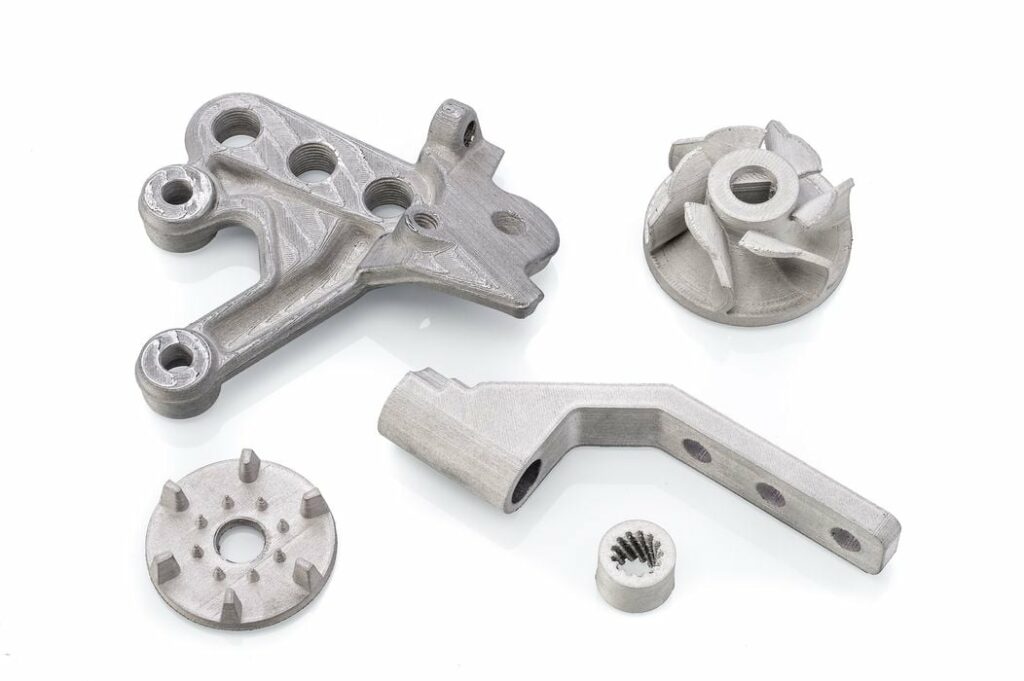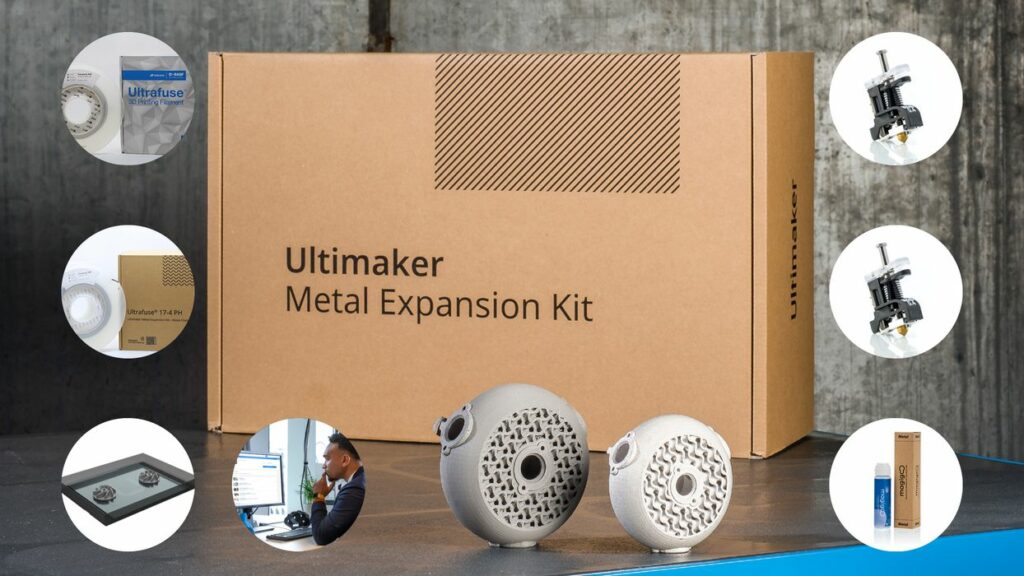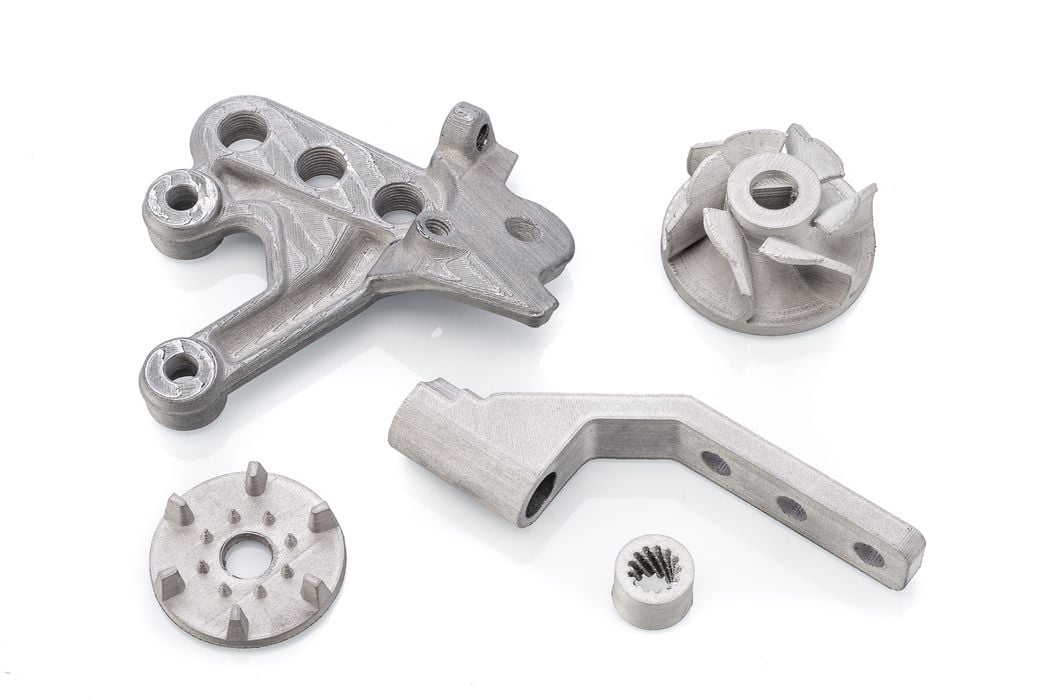
Ultimaker announced the “Ultimaker Metal Expansion Kit”, which enables metal 3D printing on their S5 model.
Metal 3D printing is usually a rather costly affair, involving specialized equipment, metal powder, complex HVAC environments, expensive post processing equipment, sophisticated thermal simulation software and a squad of engineers. As a result it can be extraordinarily expensive to undertake and is applicable to only industries where parts are traditional expensive, like aerospace and certain healthcare applications.
But there are other approaches for 3D printing metal objects. Alternative processes can be less expensive and arduous by using “cold” metal 3D printing processes or unusual FFF methods.
The latter is now being officially implemented by Ultimaker. The new Ultimaker Metal Expansion Kit can transform an Ultimaker S5 3D printer into a metal printer, and it’s actually quite straightforward.

Ultimaker has partnered with BASF Forward AM to use their Ultrafuse 17-4 Stainless Steel filament. This is a specialized filament that is a mix of a binding polymer and stainless steel powder.
The process used to produce metal objects is very similar to 3D printing polymer objects, as the differences show up during post processing.
A metal object is printed in the usual manner with the Ultrafuse filament. The resulting object is a mix of steel powder and polymer holding it together. This fragile object, called “green part”, must first have the polymer removed through a debinding procedure, which can be done through heat and/or chemical methods. Once the polymer is removed, the now “brown” part is exposed to high heat in a furnace to sinter the metal particles together.
The result is a fully solid metal object, but one that’s slightly smaller due to the removal of the polymer binder.
You might wonder why a kit is required to do this, as it seems relatively straightforward to do. However, it turns out there are some snags that might stymie most 3D printer operators.
First, the Ultrafuse filament is quite abrasive due to the presence of very hard stainless steel particles. As this material flows through the extrusion system, it can erode away software materials, such as brass nozzles typically found on polymer FFF 3D printers. That’s why the Ultimaker Metal Expansion kit includes a couple of new print cores specifically designed for this purpose. They are made from much harder materials that can withstand the abrasion.
The big issue, however, is the debinding and sintering process, which requires a furnace. Many 3D printer operators don’t happen to have one handy, and thus can’t perform this post processing on their own.
In addition, it’s not as simple as tossing the green part in a furnace. The furnace must use a very specific thermal profile over a specific time period to properly debind and sinter the metal particles. It’s not something you want to experiment with.
This is why the Ultimaker Metal Expansion Kit also includes vouchers for this type of metal post processing at a selection of experienced regional providers through the official BASF Debinding and Sintering Order Management Portal. The vouchers are for one kilogram of printed parts, and so you would use an appropriate number of vouchers to process a given part.
The green part must be shipped to the post processing provider and retuned after processing, but that’s tremendously easier than setting up one’s own sintering equipment. Ultimaker said the parts would typically be returned within ten business days.
You might be thinking that all these steps could likely be undertaken by any Ultimaker S5 operator, and that’s true. The difference here is that Ultimaker has packaged up all the necessary elements, including materials, hardware and services, into a single bundle that can be ordered, installed and used. That makes metal 3D printing more attractive and accessible to a wider audience that can then produce their own metal parts.
For those requiring some assistance, Ultimaker has arranged for learning content on the Ultimaker 3D Printing Academy related to this process.
The Ultimaker Metal Expansion Kit could be particularly valuable for those 3D printing metal parts only occasionally, as there would be almost no extra effort required for the 3D printer operator, aside from shipping.
Ultimaker’s Product Manager Andrea Gasperini said:
“The Ultimaker Metal Expansion Kit is especially suitable for printing non-of-the-shelf parts such as tools, jigs and fixtures, replacement parts, functional prototypes and auxiliary components. The Kit provides access to a complete and validated 3D printing workflow on an open platform that offers competitive quality and lead times normally only accessible with full in-house metal fused filament fabrication solutions at a much higher total cost of ownership. Thanks to the low total cost of ownership and savings up to 90% over small series of not-standard auxiliary components and tools, our early adopters are already realizing return-on-investment (ROI) in less than a year”.
The kit will enable easy casual production of basic metal parts for any Ultimaker S5 3D printer operator, opening up more possibilities for solutions. Metal parts have far higher thermal and chemical resistance than polymer parts, making them suitable for a wide range of applications.
Ultimaker said the kit will be available “summer 2022”, but did not mention pricing. However, it will certainly be a lot less than setting up your own sintering operation.
Via Ultimaker

